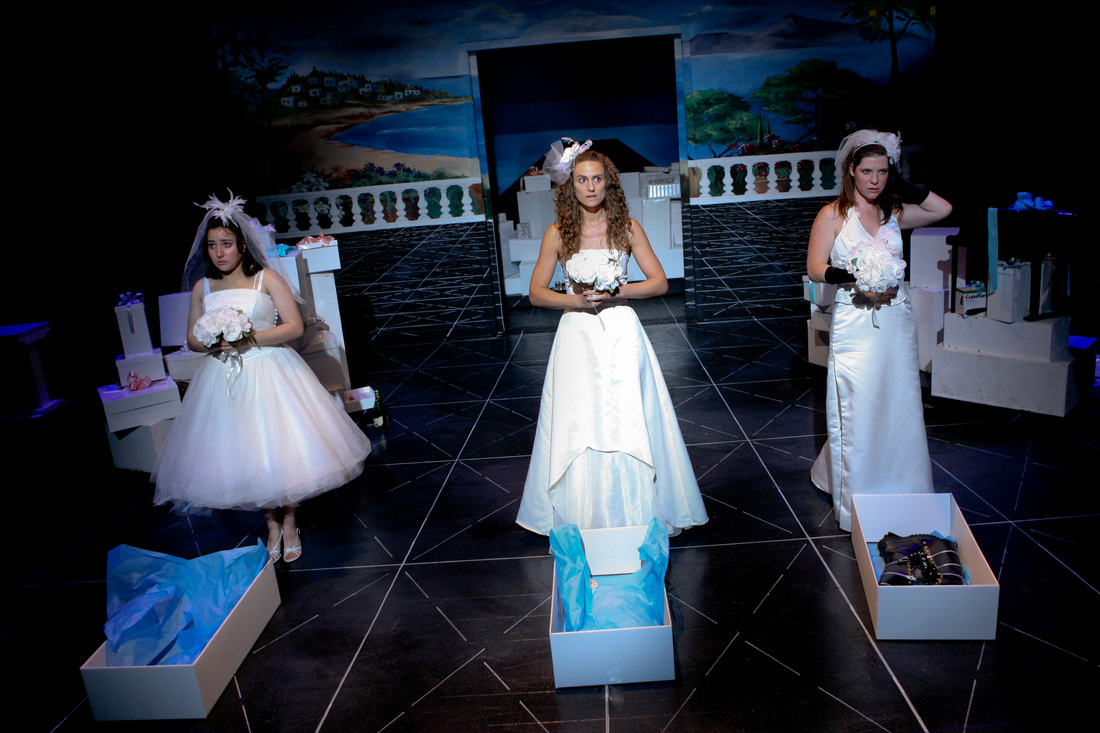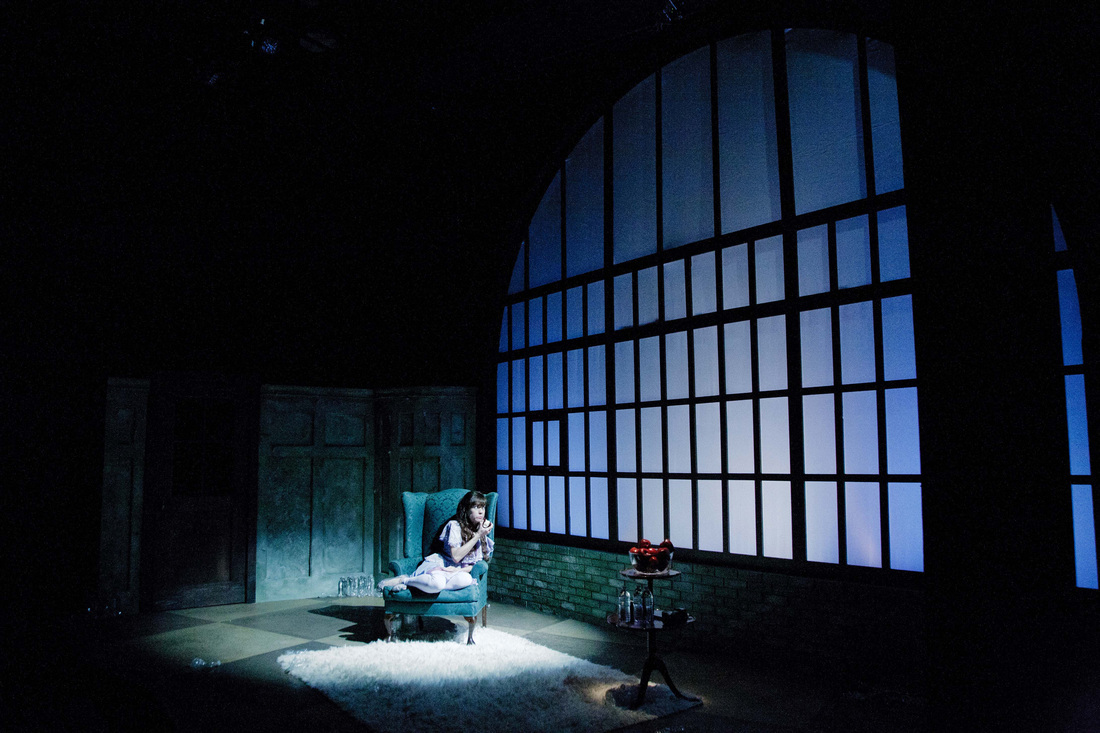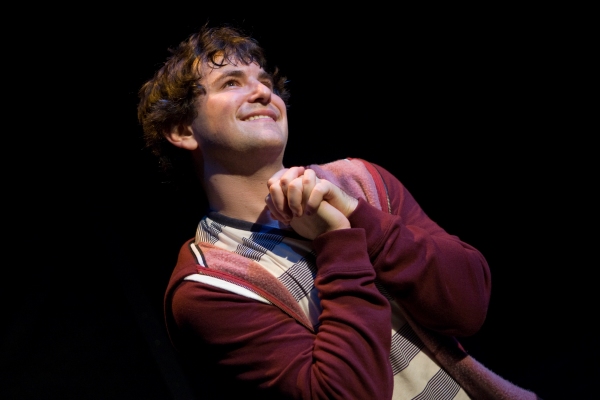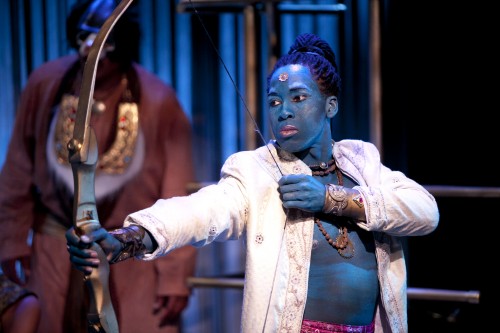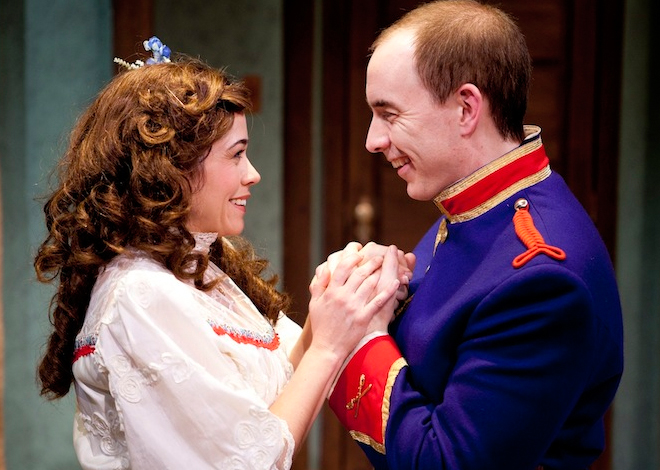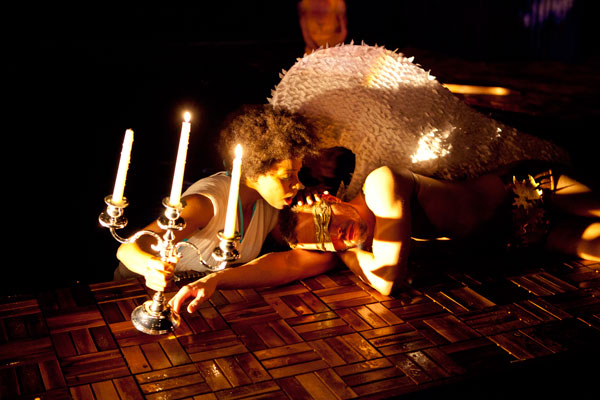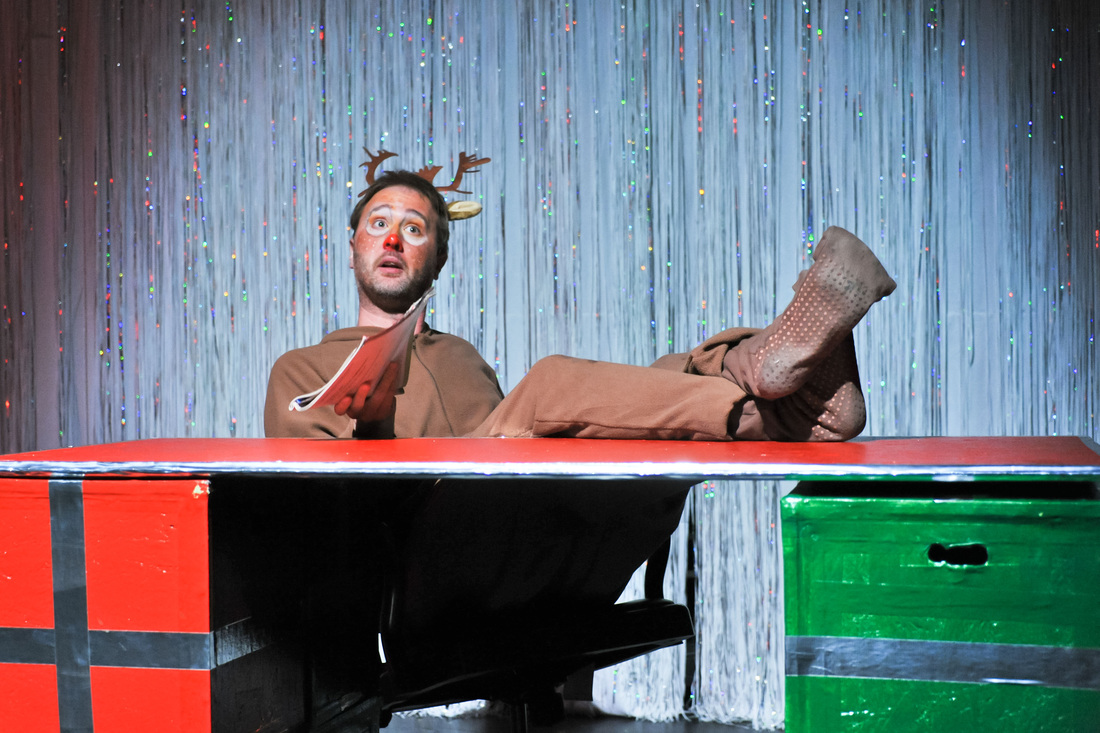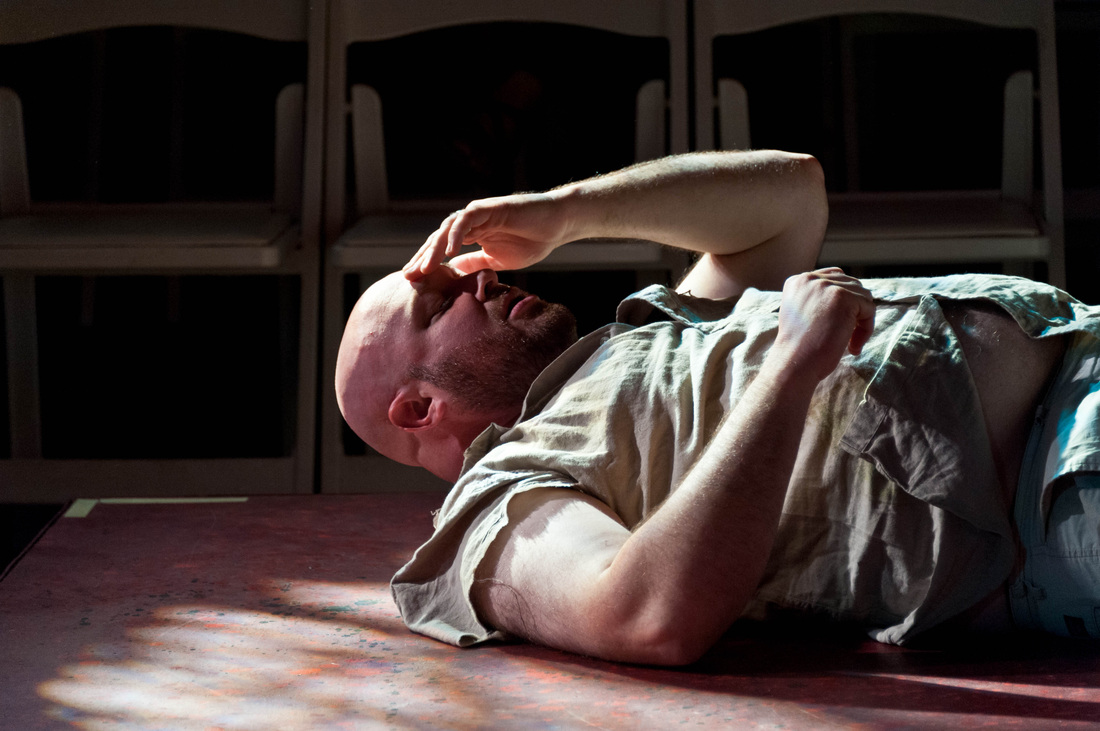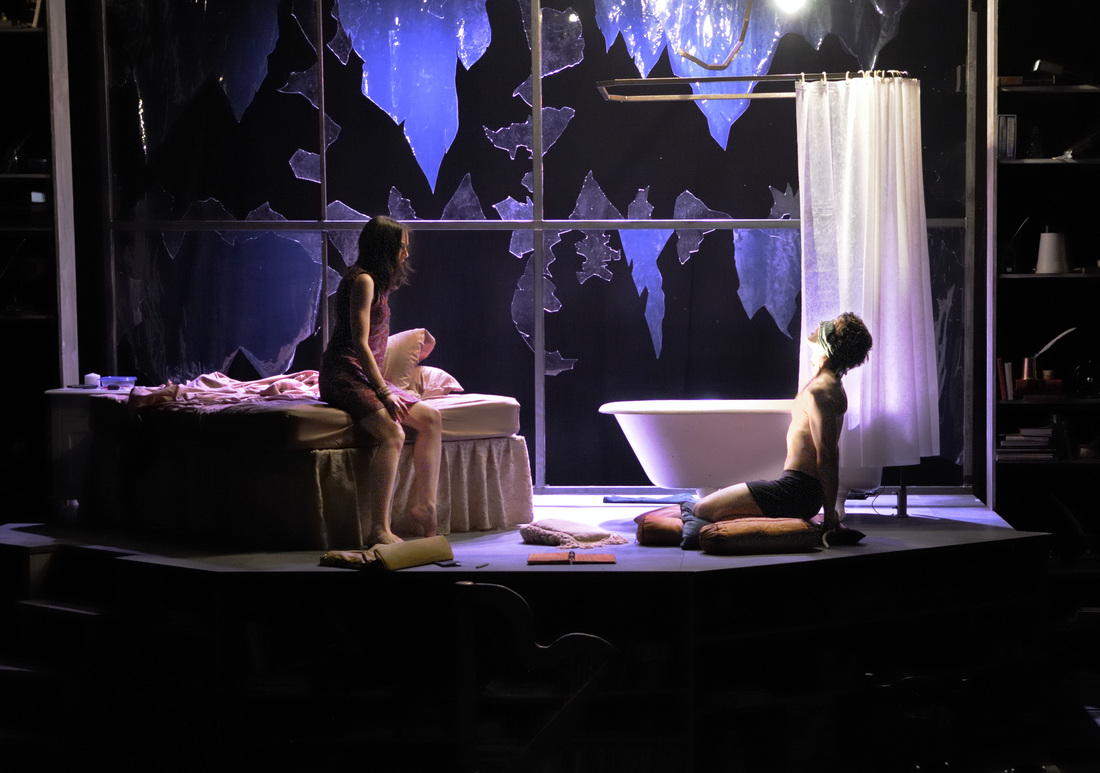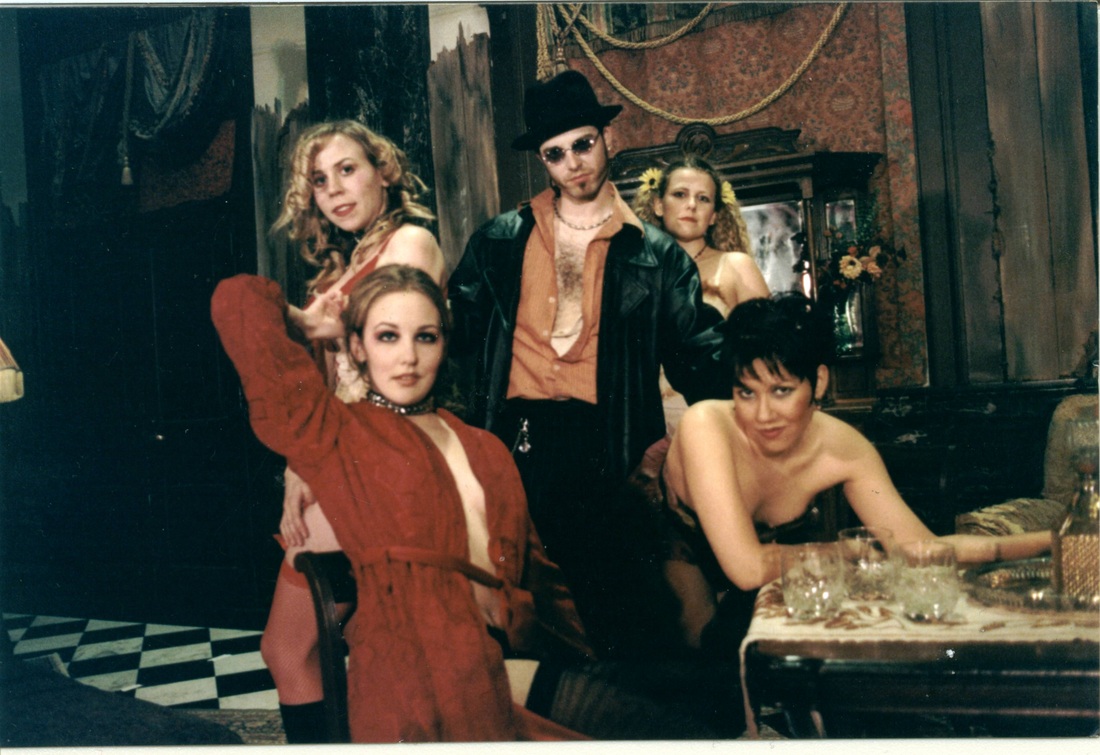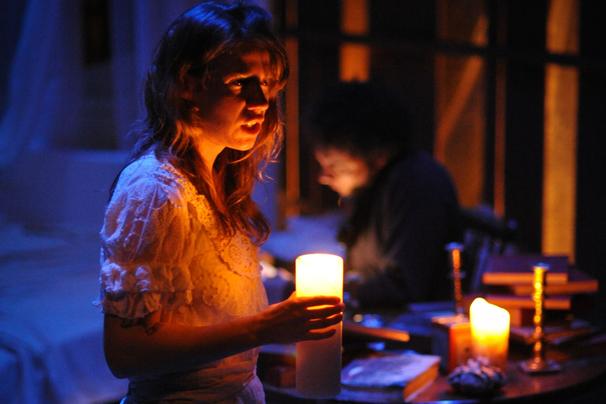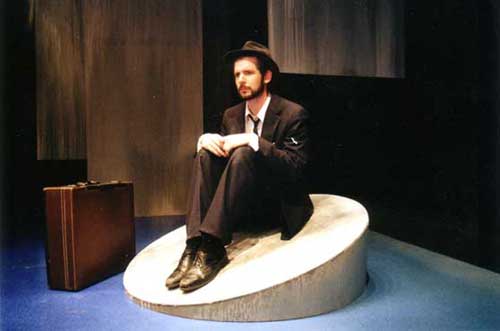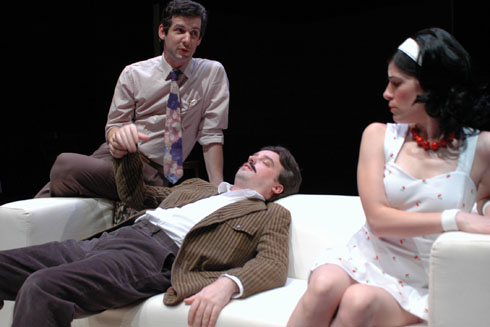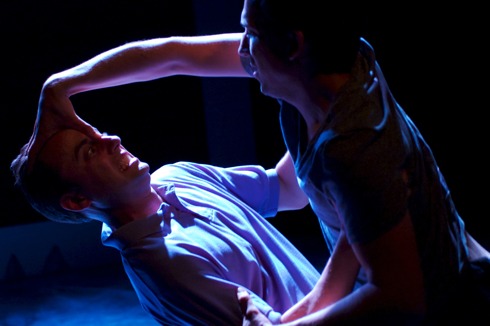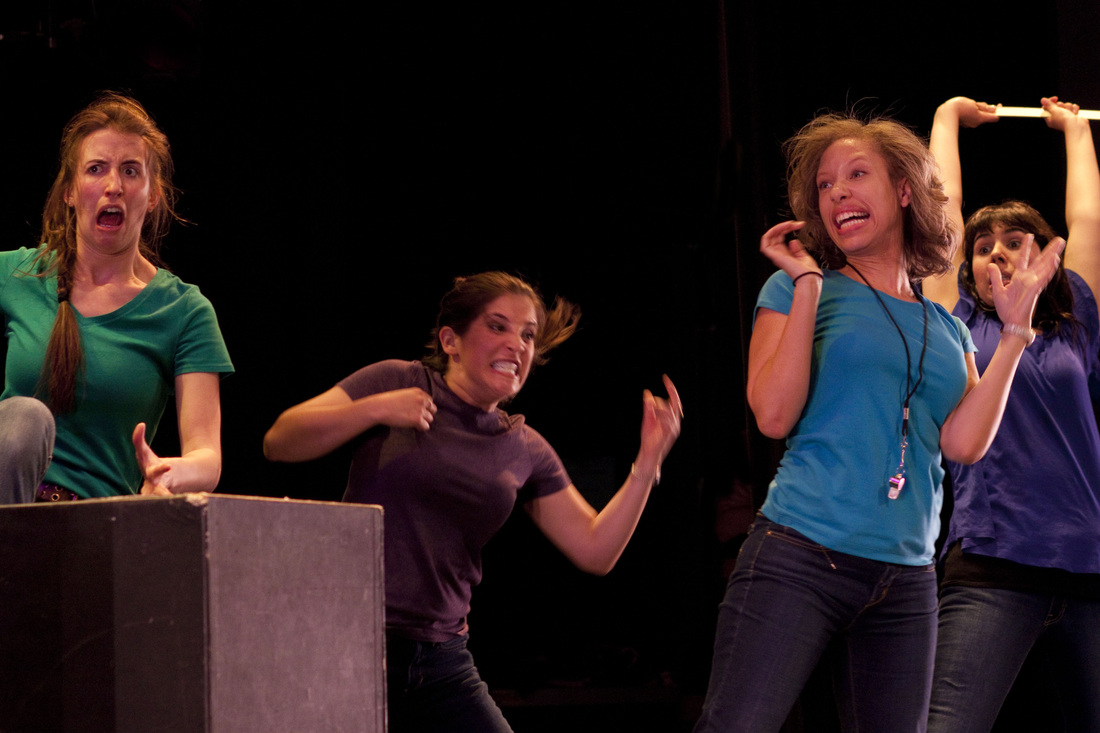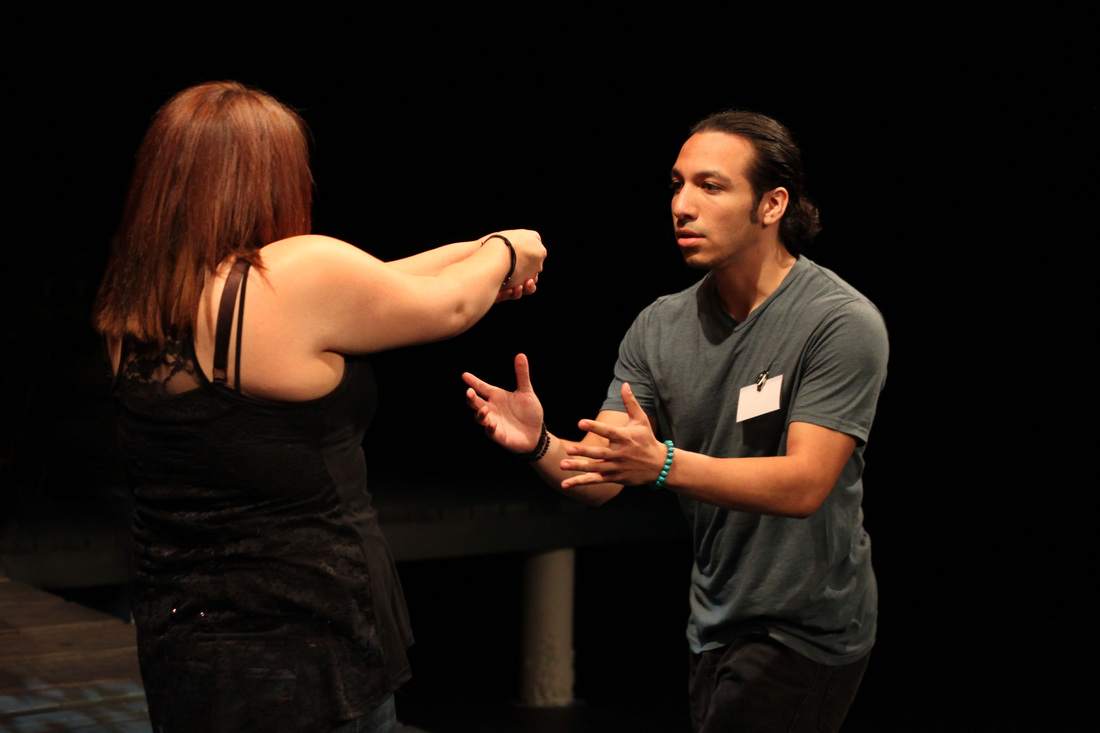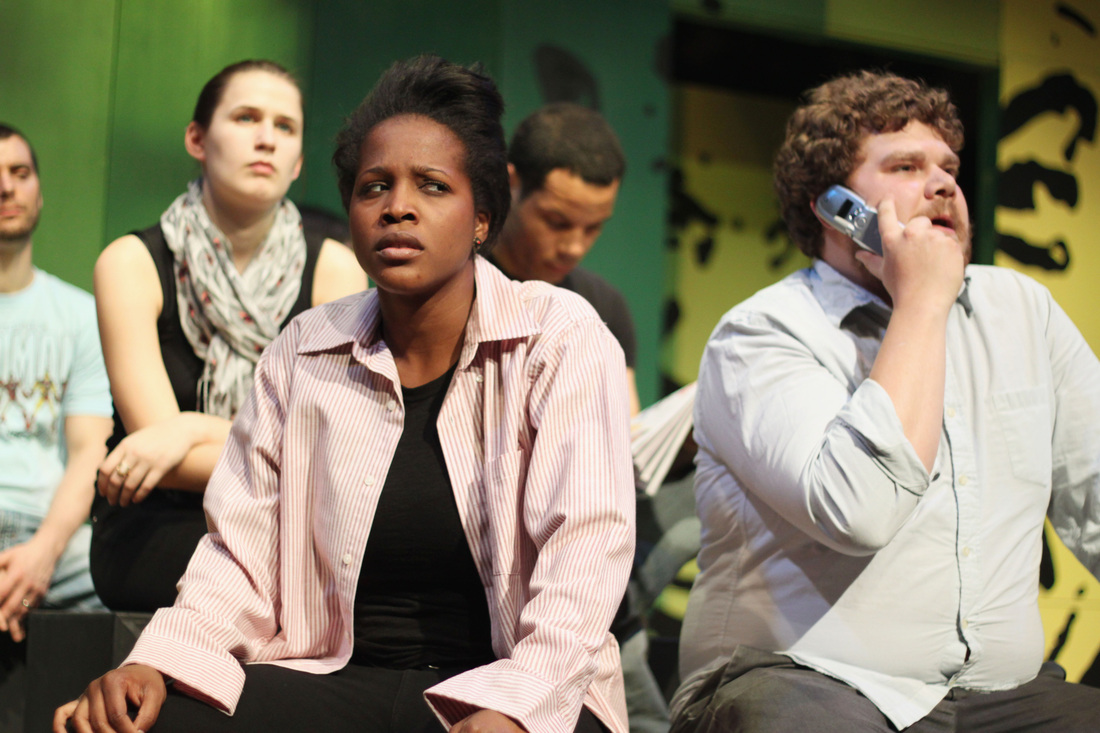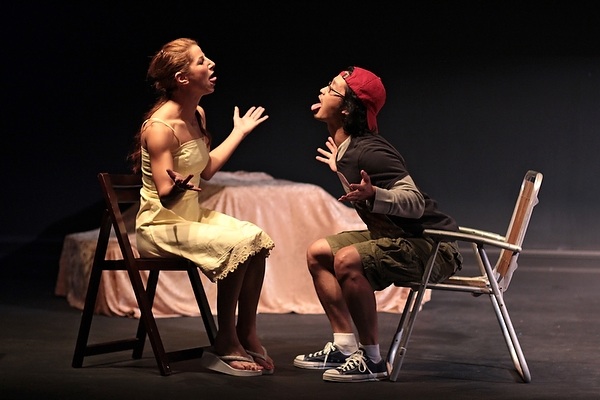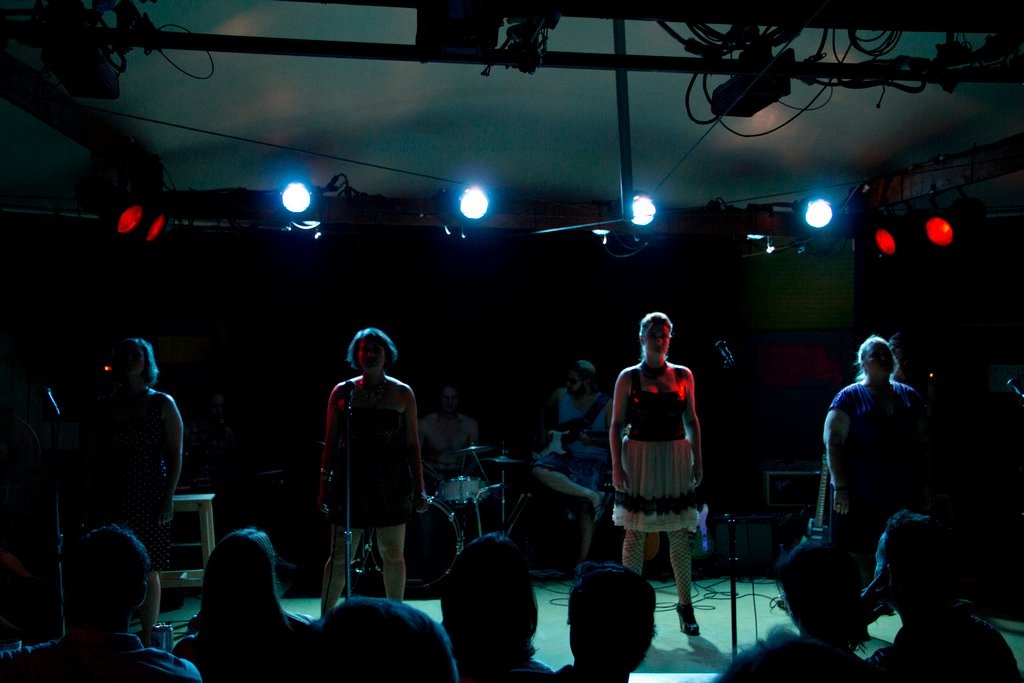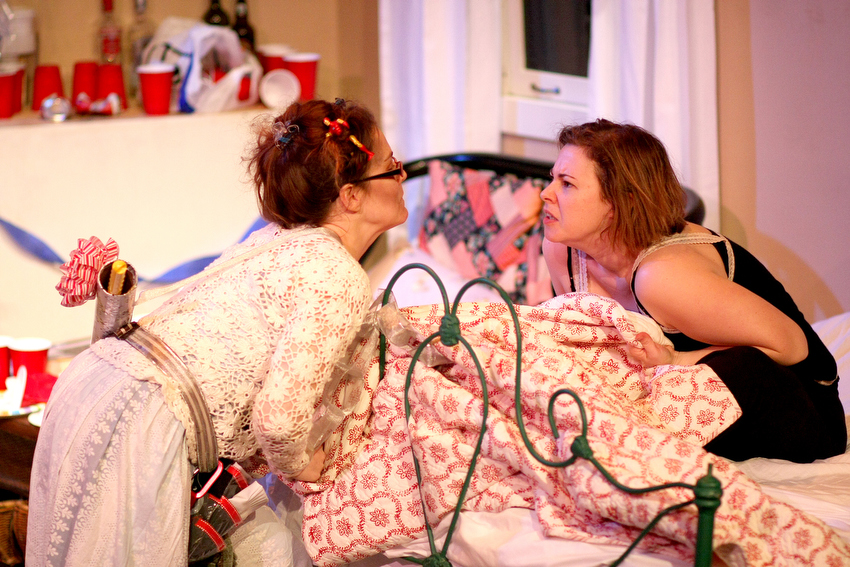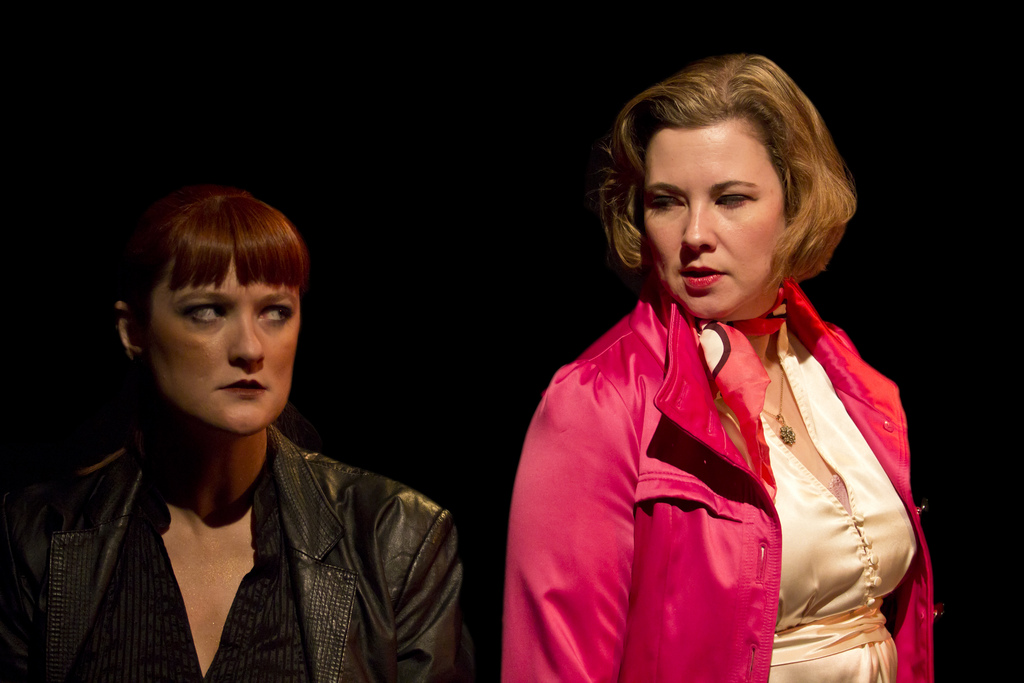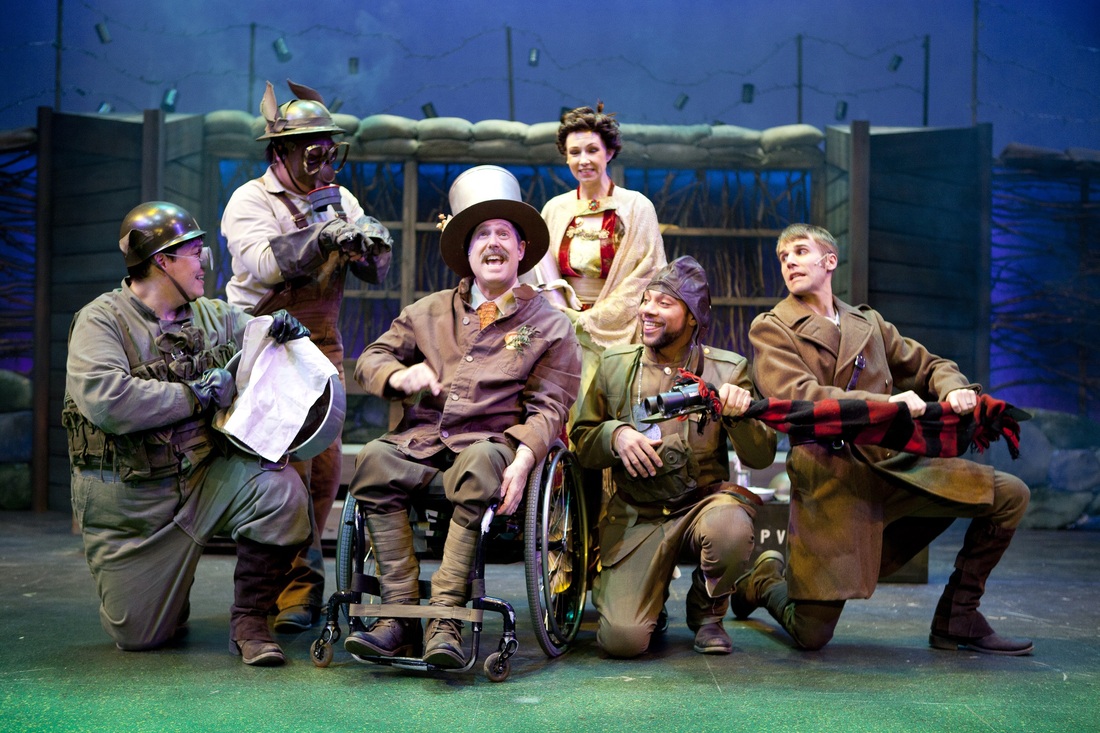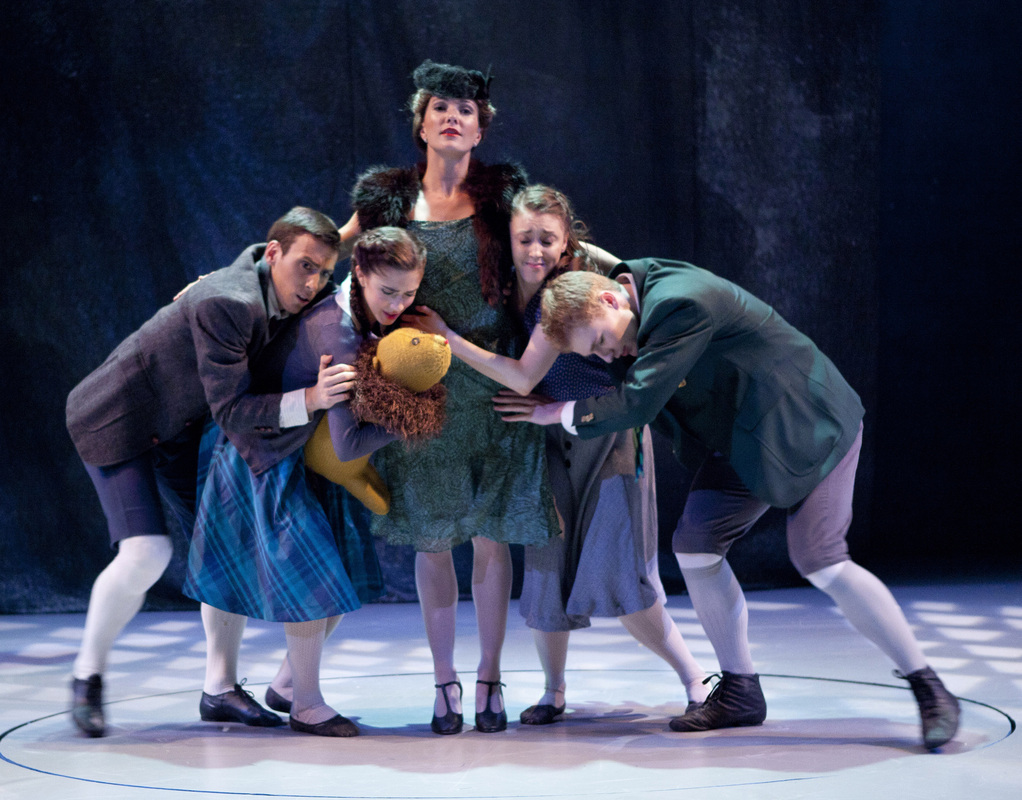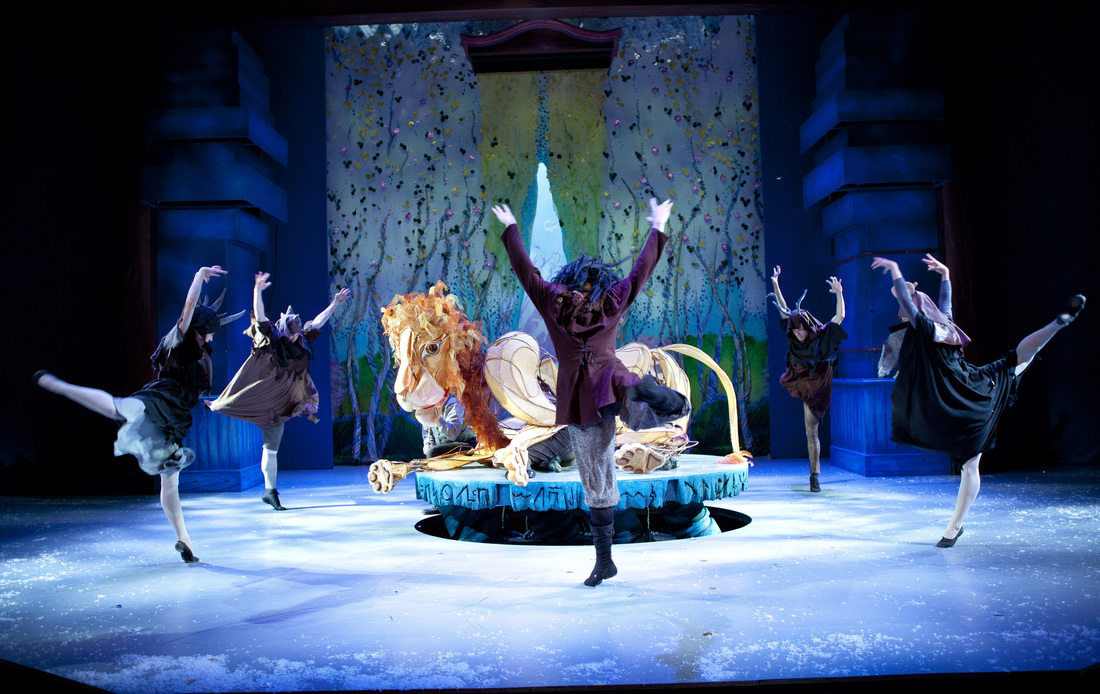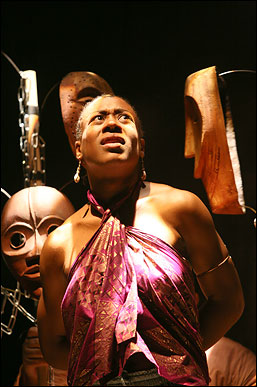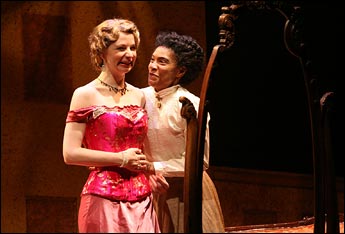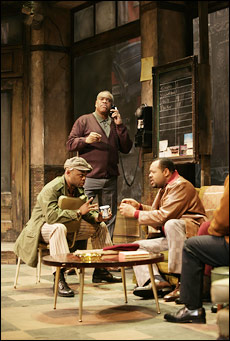|
JACQUELINE LAWTON: Why did you decide to get into theatre? Was there someone or a particular show that inspired you?
HELEN PAFUMI: I only briefly considered going into anything else. I discovered the stage early and because it was always a part of my life, it would have been more surprising if I had chosen something other than theatre. I briefly thought about politics, and painting. Both are still part of my life, but I am glad I chose to follow my current path. JL: How long have you served as Artistic Director at your company? What drew you to the position? What keeps you there? HP: I co-founded The Hub Theatre with two other amazing individuals – Marey Oakes and Maggie Ulmer – back in 2008. I have served as AD since our inception. Of the three of us, I was the natural producer. Maggie has a theatrical education background and Marey came from the administrative side of non-profits. We were a great trio. As the company changed, so did our lives. Marey serves on the Board and Maggie is in our company of artists. They are still my great sounding boards. I started The Hub in Fairfax because I felt that proximity to the city should not be the main factor in whether or not a community had high level, professional theatre. I am excited that Fairfax is growing in that realm with other professional organizations cropping up. I am driven to keep going by the fact that we are providing a new level of artistic service to this community. As urban sprawl continues, so does my belief that the future of theatre needs to lie in not just our urban centers, but in our outlying communities as well. I am very passionate about helping to define what that is, and will be. There are amazing artists and audiences in Fairfax County. Being in service to my community keeps me from ever thinking to narrowly about the plays I produce or the theatre in general. JL: What is the most valuable lesson you learned during your tenure? Also, what skills and traits do you feel a successful artistic director should have to support the health and growth of an organization? HP: The most valuable lesson I have learned is that the best idea in the room is what should be used. I have always known this logically, but it is a difficult practice to actuate. Respect cannot be sacrificed for it. The best collaborative artistic teams, board members, and staff all know this. They are able to lead with clarity and command respect, while still leaving room for the best idea from any corner. As for traits – I respect anyone coming through our doors, from those we work with to those who buy a ticket. I believe in a high level of collaboration, organization as well as artistry, an eye for great talent regardless of resume, a strong understanding of budgeting, strength of vision, adaptability, strategic thinking, and a passion for the mission of the company. That’s a run on sentence, and there are still more to go. JL What excites you most about being an Artistic Director? What is your greatest challenge? HP: I am most excited about sharing great work. When you get a stellar artistic team together with the right cast, working on the right play… the effect is what makes theatre magical. Buoying great artists and creating artistic collaborations is very rewarding. But the best moment is sitting at the back of the house, watching the audience take in everything we have collectively created. The greatest challenge is in making that magic without letting the gears show. Lack of money, time, staff, and equipment are the realities that can threaten an otherwise outstanding artistic product. It takes some major sleight of hand, and a great deal of help, for each production. JL: If your work as an artistic director doesn’t pay the bills, what else do you do? Also, how do you balance your role leading an organization with your work as a director? Are you ever able to direct outside of your company? HP: The Hub is my full time job now. Part time work includes acting from time to time, as well as dialect, audition, and public speaking coaching. I also teach creative drama to kids. I have not tried directing a full production outside of The Hub. I am sure I would if the time and play were right. As an actor though, I now will only take work outside The Hub. After the last show I did with my company I realized the burn out that would happen if I tried to produce and act at The Hub regularly. Being on stage in a Hub show cuts off my ability to take in our product as a producer or an audience member, and it is far more important for me to do that. And luckily, this area is graced with plenty of talent who are more than happy to take those roles. JL: Looking at your body of work as an artistic director and a director, how conscious are you and selecting plays by women or people of color when deciding your season? Also, when it comes to hiring administrators, designers and other directors do you take race and gender into consideration? HP: I give very little conscious thought to gender or ethnicity when I do my hiring. I bring on the best people and slate the best plays for a season. So far it has been very equitable when it comes to staffing. As for plays, although I have a good track record with gender equity, the same cannot be said of color. To be fair though, the last three plays by people of color that I asked for the rights to, were denied to The Hub. Still, its something I am aware of and am actively looking to address. JL: DC audiences are ... HP: Fun to watch a show with. JL: DC actors and designers are ... HP: Folks I am lucky to know and work with. JL: DC playwrights are .. HP: A force to be reckoned with. JL: DC critics are ... HP: Doing their jobs. JL: What advice do you have for an up and coming theatre artists who have just moved to D.C.? HP: Go to the theatre, intern (The Hub’s always looking!) get involved with the Source Festival, Fringe, attend open calls. Just get yourself out there. JL: What's next for you as a director and your company?? HP: I just directed HOW I PAID FOR COLLEGE by Marc Acito at The Hub. I am incredibly proud of the work that went into developing and producing that production. Next up I am producing A MAN, HIS WIFE, AND HIS HAT by Lauren Yee, at The Hub, which has just started preproduction. Find out more at www.thehubtheatre.org
0 Comments
Jacqueline Lawton: Why did you decide to get into theatre? Was there someone or a particular show that inspired you?
Allison Stockman: I was in a community theatre production of Snow White in first grade and I was immediately hooked. Since then there has never been a year without at least one show, if not five. I love the live community experience and I love being part of a collaborative art form. JL: How long have you served as Artistic Director at your company? What drew you to the position? What keeps you there? AS: I have been the Artistic Director of Constellation Theatre Company since founding it in 2007, six years ago. Throughout my life I’ve been drawn to leadership roles and to the theatre so being an Artistic Director is a great fit. I started Constellation because I wanted to direct epic, ensemble plays that emphasize the interdisciplinary nature of theatre – uniting elevated language, visual spectacle, original music and heightened movement. I wanted to develop a community of artists that love to work together and it often feels like a family. JL: What is the most valuable lesson you learned during your tenure? Also, what skills and traits do you feel a successful artistic director should have to support the health and growth of an organization? AS: I am learning new lessons everyday. Currently I am focusing on strategic planning and trying to imagine the future of the company in one year, in five years. A successful artistic director has to have a passion for the mission of the company. They should value and respect everyone associated with the organization, from artists to technicians, from donors to ushers. It’s a challenge, but I always try to remember that it has to be fun. No one is getting paid enough for it to be anything else. Don’t be shy to ask for money – you’re giving people an opportunity to be involved. (She says to herself, looking into the mirror;) JL: What excites you most about being an Artistic Director? AS: I love fostering good matches between directors, actors, designers, other artists etc. I love to think about how we can best serve the play in a way that is imaginative and exciting. JL: What is the greatest challenge you faced being an Artistic Director? AS: My greatest challenge is season selection. Deciding what plays to do is so important and there are so many aspects to consider: Does it fit the mission? Can we achieve success with this play in our space, on our budget? How does one play balance with others in the season? Will we be able to draw an audience? JL: If your work as an artistic director doesn’t pay the bills, what else do you do? Also, how do you balance your role leading an organization with your work as a director? Are you ever able to direct outside of your company? AS: Since I started Constellation I’ve been able to direct workshops, readings, gala performances, but I haven’t been able to commit to a full rehearsal process. Now, I finally feel like I would be able to direct elsewhere and Constellation would be able to continue our schedule without my being around quite as much. I would love the opportunity to direct at another theatre in the near future. Constellation benefits from every guest director that we bring in; I would love to be in the creative process at a different theatre and see how their practices differ from ours. JL: Looking at your body of work as an artistic director and a director, how conscious are you and selecting plays by women or people of color when deciding your season? Also, when it comes to hiring administrators, designers and other directors do you take race and gender into consideration? AS: Constellation tells stories from all over the world so there is an internationally diverse aspect to what we do. We strive to do plays that reveal the vast range of the human experience and so we embrace different perspectives. It’s exciting to collaborate with all kinds of people, diverse in race, age, culture, sexual orientation, religion, experience, etc. Of the three guest directors Constellation has had so far, two are women. This is great, but not particularly by design. I love their work. JL: DC audiences are ... AS: ... curious, enthusiastic, well-educated JL: DC actors and designers are ... AS: ... dedicated, inspired, friendly JL: DC playwrights are … AS: … imaginative, brave, inventive JL: DC critics are ... AS: … unpredictable JL: What advice do you have for an up and coming theatre artists who have just moved to D.C.? AS: Get to know as many people as possible. Accept any opportunity to practice your craft that isn’t morally objectionable. Take the initiative to create art on a small scale. Investigate the Fringe. JL: What's next for you as a director and your company?? AS: We’re opening Zorro next week. It’s our first world premiere and I’m incredibly excited. While that swashbuckling adventure entertains DC audiences, we will be designing one of the oldest stories in the world, the epic Gilgamesh. JACQUELINE LAWTON: Why did you decide to get into theatre? Was there someone or a particular show that inspired you?
CHRISTINE LANGE: I'm not sure it was really a decision. I had a certain aptitude for creating my own world and telling other people what to do (some might say I was bossy) that lent itself naturally to theater. My first play was in the 2nd grade, but I didn't take theater classes until 7th grade. And even then, I never considered it as a potential career or something I'd devote my life to - it was just fun. My freshman year in college, I had plotted out my course as a biology-geology double major with appropriate internships, and eventual PhD in Marine Biology. A friend directed a short play I wrote as part of a cabaret at her college, and I went to see it. I was struck by the realization that these people were in this room because I had written a play. Something I put into motion as an individual drew all these people together to this one place. Whether it was writing, acting, or directing, whatever came out of it was unique to me, and I suddenly understood how much I craved that. It didn't matter if my version was better or worse (although you always want it to be better) than someone else's - it mattered that only I could do my version of it. So I transferred to George Mason and got my degree in Theater. JL: How long have you served as Artistic Director at your company? What drew you to the position? What keeps you there? CL: Grain of Sand is about 2 years old since it began with an application to 2011's Capital Fringe Festival. I was brought on as Artistic Director shortly after the first production, Hamlet: Reframed, was accepted into the 2011 line up. The project itself was interesting to me, but I've known two of the founders Carl Brandt Long and Sara Bickler (John Stange is also a founder) for a good chunk of time now. I already knew we had similar aesthetic tastes, but we have a variety of strengths and weaknesses that complement each other well. I was and continue to be excited by the ways those similarities and differences come through in our art. It really comes down to a lot of trust. I feel like I trust the people who make up Grain of Sand, and that gives me the freedom to stretch and try new things artistically. If I go too far, they'll give me a little nudge back onto safer ground, but we have a strong base to start from. JL: What is the most valuable lesson you learned during your tenure? Also, what skills and traits do you feel a successful artistic director should have to support the health and growth of an organization? CL: As a young company, we are very conscious of keeping the momentum going and increasing the visibility of our company. However, we are only human. No matter how much we'd all like to be 100% committed to every piece of every project, the human body can only handle so much stress and so many late nights. Caffeine will only take you so far. What we're learning now as a company is how to use the resources we have to the best advantage and to be realistic about which projects are priorities and at what scale they can feasibly be accomplished. I think it's important for an artistic director to have experience in most if not all the different aspects of theater. The more you know, the more respect you'll have for people who specialize in those areas, and then you can use that experience to help pick the right people for the right jobs. You cannot make a production happen on your own, and you have to be able to recognize when someone is better suited to a certain role. Likewise, you need to be able to identify when someone is not succeeding in a given position and find a better place for them. I think building trust with your team is the most important thing you can do. If people feel like you'll listen and that they can rely on you, problem solving the difficult issues will be a million times easier. JL: What excites you most about being an Artistic Director? CL: I love being responsible for crafting a plan that spans more than just one show - the sense of continuity. To look at a series of pieces and decide how they best fit together to create something bigger and better is challenging but incredibly satisfying. There's something about being outside the production in a sense - not in the trenches as the director or designers, etc. - that allows for so many more possibilities. I'm not limited by my own aesthetics or abilities as a director or a performer. If I can imagine something better that meets the needs of my company, I can go and find the people to make that project happen. It means my imagination can go wild, and I still feel the satisfaction of the piece because I helped bring all of those people together. It's like a big puzzle I enjoy solving: I want to use these people in this time frame with this budget, so what show should we do? It makes my brain work in a way completely different from other parts of my life, and that is very exciting to me. JL: What is the greatest challenge you faced being an Artistic Director? CL: It's hard work. Even for a small company, trying to juggle several different elements at the same time is tough. There are various priorities and personalities that all need to be considered and respected, and I need to weigh those interests against my own personal artistic goals as well as the company goals as a whole. It's a lot to balance. I think the biggest challenge is making sure I'm still listening and keeping an open mind about where the company is going. I don't want to get caught up in my excitement over a specific piece or project, but there are also times when it is okay to push my own agenda because it does match what the company needs to do to grow. JL: If your work as an artistic director doesn’t pay the bills, what else do you do? How do you balance your role leading an organization with your work as a director? Are you ever able to direct outside of your company? CL: Maybe someday Grain of Sand will have a full-time staff, but for now I work full-time as an Accounting Analyst for GWU's School of Public Health. I am very lucky to have a boss who is interested in my life in the theater and is willing to be flexible when I need to come in late or leave early. It's a gift to be able to say "I can't have a meeting that day - it's Opening Night" and know he'll understand. Right now, I'm primarily focusing on GoS for my artistic projects. We're working on building our pool of resources so that in the next year or so, we'll all have a little more wiggle room. But for the immediate future, we're working on defining our voice and creating our brand and that's my top priority. JL: Looking at your body of work as an artistic director and a director, how conscious are you and selecting plays by women or people of color when deciding your season? Also, when it comes to hiring administrators, designers and other directors do you take race and gender into consideration? CL: In general, I pick plays based on the content and the quality of the piece. We've put out calls for scripts, and they were evaluated without considering gender or race. In terms of building a team, the qualifications of the candidate and his/her ability to work successfully with the existing members are our only considerations. JL: DC audiences are ... CL: Getting there! I was having a conversation recently about "teaching" audiences. We were talking about companies that are good at bringing in brand new theater-goers who get bit by the theater bug and start going to see shows at other theaters. As we see more small theater companies popping up in DC, we're also seeing audiences adapt to a different kind of experience. Groups like GoS typically come with a smaller ticket price, but we're also more likely to be producing non-traditional projects. Audiences are learning to take a chance on us because the financial commitment is smaller, and while the outcome may be unexpected, it's usually interesting. I feel like audiences are recognizing smaller groups as their own tier of theater, and if they enjoy one group are more willing to take a chance on another group from the same tier. JL: DC actors and designers are ... CL: Dedicated. It's amazing how much people are willing to sacrifice to be a part of these projects. And the commitment they bring to each show is humbling. I think we're all used to working in a theater with no heat or no a/c or rats or whatever other issues, and that just becomes a minor complaint because there's nothing else we'd rather be doing. JL: DC playwrights are .. CL: Numerous, varied, and incredibly talented. The DC playwright community has been rich and vibrant for many many years, but I feel like they've become so much more accessible in the past couple of years thanks to social media. It's exciting to see so many playwright groups self-producing staged readings to get their work out there and get their names on the radars of companies that are looking for new work. I look forward to working with two local playwrights in this next year - one we're helping to workshop a commissioned piece and the other will be writing our Fringe show for 2013. JL: DC critics are ... CL: Diligent. There is so much theater happening in this town, and it's great to see these corps of critics getting out and reviewing pieces from all areas of the spectrum, from community theater to the big houses. For better or for worse, having a review of your show is still one of the easiest forms of PR. This is another area where the Internet and social media has improved accessibility and distribution. JL: What advice do you have for an up and coming theatre artists who have just moved to D.C.? CL: Go see shows and hang around with the cast & crew at the bar afterwards. Don't be afraid to ask questions. And let us know how you want to be involved. I'm pretty good with names and faces and just because I can't use someone in an immediate project, doesn't mean they won't hear from me months down the road. Showing an interest in the company instead of just one particular production is also a great way to earn a gold star. And it's always a good idea to join Actor's Center. Taking classes there is a great way to meet people in the theater community. JL: What's next for you as a director and your company?? CL: We will be making some announcements very soon about our upcoming year. The big project for 2013 will be our Fringe show, but I am thrilled about an opportunity coming up in February. We're planning to be part of a collaborative event headed by local band, bellflur, that will combine live music, the written word, and visual art, as well as performing artists. We'll also be doing a staged reading in the spring. JACQUELINE LAWTON: Why did you decide to get into theatre? Was there someone or a particular show that inspired you?
JENNY MCCONNELL FREDERICK: I think it was an accumulation of experiences--dance competitions, drama classes, elementary school field trips (to Folger and Arena Stage), high school productions, directing for the first time. I think I fell in love with the magic of it at a really early age. The way a theatre smells. The change in the air when an audience fills that space. That wonderful tension watching the action from backstage. The theatre’s transportive powers. I just loved everything about being in that kind of sacred space. JL: How long have you served as Artistic Director at your company? What drew you to the position? What keeps you there? JMF: I co-founded Rorschach Theatre in the summer of 1999 along with my co-Artistic Director Randy Baker. I was 22 and we wanted to make our own work and to take charge of that work from top to bottom. What keeps me there? I believe in what Rorschach has to say. Over 14 years the company has come a really long way in finding its voice--in knowing who we are and what we want to bring to theatre as a whole--but that evolution never ends. Everyday is different, every challenge is different and it’s daunting and exhausting but it's incredibly rewarding too. (Before I was a parent, I used to say having a theatre company is like having a kid--and now that I have a kid--it really is similar--less cheerios in theatre, but a lot of that same exhilaration/anxiety cocktail.) JL: What is the most valuable lesson you learned during your tenure? Also, what skills and traits do you feel a successful artistic director should have to support the health and growth of an organization? JMF: There are so many things I’ve learned. One of the most important I think is having a sense of when to listen to others and when to trust in yourself. It’s a delicate balance--and it’s different with every choice. And it’s not an easy lesson to learn when you’re running a largely volunteer organization with your peers. You want everyone to feel like they’re being heard. Other skills and traits I think are important: vision, patience, ambition, and a really wide bandwidth for multi-tasking. JL: What excites you most about being an Artistic Director? What is your greatest challenge? JMF: I love the depth and breadth of the experience. At any theatre, but especially in a small one, there’s an opportunity to touch on every aspect of the process. And as much as I love directing work for my own company, there’s something really satisfying about stepping back and watching the other incredibly smart artists come into our (metaphorical) doors and make work in the Rorschach aesthetic. The greatest challenge: Personally, I think is balance. Balancing the art with the administrative. Balancing the company with life and family. Tangibly, it’s money. There’s never enough. Less tangibly, I think it’s just being really relentless about the companies continued evolution--allowing it to grow and change while still staying true to it’s mission. JL: If your work as an artistic director doesn’t pay the bills, what else do you do? Also, how do you balance your role leading an organization with your work as a director? Are you ever able to direct outside of your company? JMF: My “day job” is Director of Performing Arts at CulturalDC where I produce Source Festival and run the Mead Theatre Lab. It’s hardly fair to apply the potentially disparaging “day job” moniker to my work at CulturalDC though. It’s an amazing place that provides hundreds of opportunities to visual and performing artists every year. I think the balance between my work at CulturalDC and at Rorschach ends up being really mutually beneficial--for me and for both companies. As for balance--it’s hard. Everyday is a juggling act of priorities--but I feel really lucky to be able to do both. That said, it doesn’t leave a lot time for directing outside. I’d love to, it’s just not something I’ve ever really pursued. JL: Looking at your body of work as an artistic director and a director, how conscious are you and selecting plays by women or people of color when deciding your season? Also, when it comes to hiring administrators, designers and other directors do you take race and gender into consideration? JMF: To be totally honest, it’s not something we discuss at Rorschach. We’ve prioritized our company’s subjective aesthetics as the primary tool for decision making--does the script/artist fit our company’s mission? With that approach, roughly 30% of the scripts we’ve produced and 54% of our directors have been women or people of color. We’re much less concerned with gender and race and much more concerned about whether an artist bleeds Rorschach blood. JL: DC audiences are … JMF: Smart, supportive and opinionated. JL: DC actors and designers are … JMF: Savvy, creative, resourceful...and overworked and underpaid. JL: DC playwrights are .. JMF: Ambitious. There’s so much great drive right now to make DC known as a vibrant playwrights’ town and all the attention is well deserved. JL: DC critics are … JMF: Really smart, (most of them), really supportive of theatre in DC, and not to be praised or condemned any more than any other audience member. JL: What advice do you have for an up and coming theatre artists who have just moved to D.C.? JMF: Do it all. Try it all. Find your voice. Ask for help when you need it. JL: What's next for you as a director and your company? JMF: First up is Source Festival 2013 in June which is going to be amazing! (We’ll be announcing the line-up in the next week or so.) Then I’m directing Neil Gaiman’s NEVERWHERE for Rorschach in August. It’s huge and amazing and very very Rorschach. JACQUELINE LAWTON: Why did you decide to get into theatre? Was there someone or a particular show that inspired you?
KATHLEEN AKERLEY: When I was something like seven or eight years old my sister Helen and my friend Valerie and I wrote and performed a play called The Pearbird, about a brother and sister living in the woods who are saved during the cruel winters from subsisting on bark by a magical bird who makes special food grow on the trees. This magical food in our version (I’m sure it would be different in the Peter Brooks version) was popcorn spread out on an old dress (so it was more of a magical shrub, I suppose), which alluring set element of course was more than the audience could resist, and the fourth wall was broken by most of our neighborhood friends. I never decided to get into theater, I just did theater (Valerie and I also, around that time, wrote and performed The Sleeping Man and The Thief, which was the role-reversing slapstick it sounds like it would be, and a year or so later collaborated with several neighborhood friends on an old, short play, that I now can’t find evidence of anywhere, called Eileen McSweeney’s Ghost). Many things have inspired me to stop doing theater, but I never had to be inspired to do theater. JL: How long have you served as Artistic Director at your company? What drew you to the position? What keeps you there? KA: Since 1998, when the company was established. I started the company to do a production of Macbeth that I couldn’t get out of my head; I stay in the position because every summer I get to take my brain out for a spin in the company of good friends who are also skilled artists. JL: What is the most valuable lesson you learned during your tenure? Also, what skills and traits do you feel a successful artistic director should have to support the health and growth of an organization? KA: Valuable lesson: how to cope in a lose-lose situation and live with my choice. Skills and traits: I personally feel – this is just for me, I’m not saying everyone should share this value – that a successful artistic director will recognize the difference between the ‘health’ and ‘growth’ of a company, but that’s my soapbox about maintenance economies that no one needs me to re-mount. JL: What excites you most about being an Artistic Director? What is your greatest challenge? KA: Getting to take something that exists in an isolated part of my brain and express (in this context a massive verb with any number of footnotes and drop-down menus) it for and with other people. My greatest challenge by far if I ran the company the way many people have encouraged to me run it would be networking but fortunately I have Heather Haney as a company member (she is our voice of Twitter, among other skills) and anyway try to operate the company in a way that minimizes the need for fund-raising; the greatest challenge for me in running the company the way I want to run it is not feeling like I died any time a company member moves on. JL: If your work as an artistic director doesn’t pay the bills, what else do you do? Also, how do you balance your role leading an organization with your work as a director? Are you ever able to direct outside of your company? KA: I work part-time in a law office, freelance as an actor, director, playwright and teacher, and have just finished my training to be a massage therapist and hopefully will get my license later this month. Because Longacre Lea only does one show a year I and the other company members can easily balance working with the company and working with other companies. JL: Looking at your body of work as an artistic director and a director, how conscious are you and selecting plays by women or people of color when deciding your season? Also, when it comes to hiring administrators, designers and other directors do you take race and gender into consideration? KA: I don’t think of gender in anything except mate selection and, where needed, in casting; I don’t think of race except when Chris Holbert makes jokes about calling the curtains ‘blacks.’ I know these are not trivial matters – I have more than an academic awareness of how discrimination plays out – but to me the best choice I can make is not to discriminate at all. JL: DC audiences are ... KA: … unlikely to have nougat centers. JL: DC actors and designers are ... KA: … kind of like the farmer and the cowman: the actors demanding water rights, the designers building fences. I can stretch this feckless analogy further if need be. JL: DC playwrights are … KA: … the sun, I am the moon, they are the words, I am the tune. JL: DC critics are ... KA: … comin’ ‘round the mountain when they come. JL: What advice do you have for an up and coming theatre artists who have just moved to D.C.? KA: … Don’t be impressed by anyone, including yourself; don’t disrespect anyone, including yourself. JL: What's next for you as a director and your company? KA: I’m directing the ‘Voodoo’ Macbeth for American Century Theatre – not trying to recreate Welles’ production so much as searching for the modern equivalents of his intentions. As for my company, we'll be on hiatus this year but fully committed to the 2014 return. JACQUELINE LAWTON: Why did you decide to get into theatre? Was there someone or a particular show that inspired you?
NICOLE JOST: I’ve loved theater since I was a kid. But one particular show that inspired me as a young person was Tony Kushner’s Angels in America. I had a suspicion that theater could be a force for social justice, and Kushner’s work confirmed it. I fought very hard to get Part I: Millennium Approaches to my high school stage and, with the support of some wonderful people, I was successful. During one of the performances, right at the moment when Louis and Joe kiss, a teacher who was in the audience gasped audibly. The next day, she came to talk to me. She was embarrassed. She said she had been up all night, thinking about her reaction and the reasons for it. That to me was theater at its best – a moment onstage elicited an honest, visceral reaction that threw into question this woman’s way of looking at the world. From then on, I was hooked. JL: How long have you served as Artistic Director at your company? What drew you to the position? What keeps you there? NJ: I’ve been YPT’s Artistic Director since October 2012. I originally came to YPT as an intern in 2006. I was inspired by my experience in our In-School Playwriting Program. My experience of being a teenager and seeing my words come to life in the hands of professional adult artists became a model for what I hoped to give other young people in DC. I had also seen firsthand the inequalities that pervade DC schools: the education that I and my privileged, mostly white, middle class, friends received did not match what was being offered to the majority of students across the city. Working for YPT became my way to address this injustice using my art form. Being Artistic Director of a small nonprofit with huge ambitions is not easy, but our students keep me going. It’s impossible to be discouraged when a timid student turns in a 20-page play, when a young student pens a fantastical tale of impossible characters, when a student reveals to you that she never thought she was a good writer before she tried her hand at writing a play. I’m very fortunate in the sense that even as Artistic Director I have the opportunity to teach – every Wednesday I lead our Young Playwrights’ Workshop program. The Workshop is YPT’s youth theater company. Members work together to create, develop, rehearse and perform an original play during the course of the school year. It is such a gift to see them every week. I defy you to be in a bad mood after hanging out with these amazing young people. (Come see them at the Source Festival in June!) JL: What is the most valuable lesson you learned during your tenure? Also, what skills and traits do you feel a successful artistic director should have to support the health and growth of an organization? NJ: I’m a very new AD, so I’m still discovering what the position means for me and for the company. So far, the most important thing has been to develop a clear and compelling vision for our artistic programs, and to communicate that vision. For YPT that means not just performances but educational programming – education is the core of our mission. YPT is a highly collaborative workplace, so visioning never happens in isolation. But it’s important to step up as a leader, to pose challenging questions, and to listen. Listening is huge. JL: What excites you most about being an Artistic Director? What is your greatest challenge? NJ: I’m excited about having the big picture in mind. I like to think that way, and I did think that way about YPT even as an intern. (Which was probably very obnoxious.) My greatest challenge is defining what it means to be an Artistic Director for me, for YPT, for an arts education company. And I suppose that other ADs face this challenge as well – how to make the role your own. JL: If your work as an artistic director doesn’t pay the bills, what else do you do? Also, how do you balance your role leading an organization with your work as a director? Are you ever able to direct outside of your company? NJ: I am very fortunate that my work as an Artistic Director does in fact pay the bills. My challenge is balancing my work as a playwright with my work as Artistic Director. I pour a lot of myself into YPT, and sometimes that means at the end of the day I don’t have it in me to write. That’s hard, but it also forces me to think seriously about balance and maintaining a healthy frame of mind. Those are things I think everyone should consider, no matter what your job is, so in that way it’s actually a blessing. But YPT also sustains me as an artist. I’m engaged every day in making theater, so I work out my creative muscles regularly. I do work with other companies on my own plays (in fact, YPT only produces the work of our students, so I am not eligible to have my work produced within the company). These experiences help me relate to our students. As a teaching artist, I can get locked into the role of cheerleader, always saying “You can do this.” Doing my own writing reminds me that making theater is hard! We are challenging our students in a big way, and it’s important for me to remember that as a leader. JL: Looking at your body of work as an artistic director and a director, how conscious are you and selecting plays by women or people of color when deciding your season? Also, when it comes to hiring administrators, designers and other directors do you take race and gender into consideration? NJ: YPT is committed to improving access and equity in the field of arts education. The cuts in the arts that we hear so much about have disproportionately impacted young people of color (particularly African Americans and Latinos) and working class communities. Every young person has a right to learning in the arts, and in fact I have found through working with YPT that the arts have a special power to help students who are struggling – whether it be because of racial and gender oppression, poverty, the challenges of being an English Language Learner or having a learning disability, or something else. I’ve seen it over and over again: for students who are having problems in school, YPT’s program provides a breath of fresh air. It’s a chance for students to think and work differently, which many students need. So it is very important to us to study our impact on the DC region and offer our programs to those students who may not otherwise have access to quality arts education. Our production season is directly informed by the students we serve, so the plays we produce will always reflect the diversity of our students. As far as our artists and staff are concerned, we are like many other arts education organizations across the nation: a mostly white staff serving mostly students of color. This is an important problem for us. It’s something I will be devoting a lot of energy to specifically in the next three years as we embark on a new strategic plan. JL: DC audiences are ... NJ: Of many diverse appetites – I think you could find an audience in this city for any show you could possibly dream up. JL: DC actors and designers are ... NJ: Inventive. Dedicated. JL: DC playwrights are ... NJ: A force to be reckoned with! JL: DC critics are ... NJ: Thoughtful. Open-minded. JL: What advice do you have for an up and coming theatre artists who have just moved to D.C.? NJ: See everything. If you see something you like, hang out in the lobby. Meet the artists. Offer to usher, put up fliers, sweep the floor, whatever. The artists in this community are so welcoming, and the more connections you make the more opportunities you will have. The more you will grow. JL: What's next for you as a director and your company?? NJ: YPT’s biggest annual production, our New Play Festival, will go up on April 22 and 23. All performances are free and open to the public. This year, we considered over 850 plays written by elementary, middle and high school students in YPT’s In-School Program. Only 12 will be produced in April. So the selection process was our most competitive ever, and the 12 featured plays are amazing! We also have Young at Heart, which is part of our New Writers Now! staged reading series, on Monday February 11. Last year we held a very successful anti-Valentine’s Day performance, but our hearts have warmed a bit since then so we’ll be celebrating the holiday with four scripts that tackle the downs and the ups of love. To learn more, go to www.yptdc.org. JACQUELINE LAWTON: Why did you decide to get into theatre? Was there someone or a particular show that inspired you?
ALLYSON HARKEY: I’ve been in theatre in some form or fashion my whole life, minus 2 miserable years in the ‘90s. My dad took me to see Annie when I was a little girl, and I was hooked after that. I did every school play, took every acting class, acted out scenes from The King and I and Cats in my bedroom. I was that kid. The first person to ever tell me that I should be on stage, though, was a grade school teacher. Mr. DeYoung never smiled and scared the bejeezus out of everyone, but he made me take bigger parts than I auditioned for and taught me to not apologize for my talent. That might have been the most important lesson I’ve ever learned in a school. JL: How long have you served as Artistic Director at your company? What drew you to the position? What keeps you there? AH: I’ve been one of Pinky Swear’s Co-ADs, with Karen Lange, since the company’s inception in 2008. At first it was more of a “There aren’t many parts for us, why don’t put on the play we want to be in!” thing, but it didn’t take long for us to realize that one production was not going to quench our thirst. Quite frankly, there is not enough work for all of the women theatre artists in DC. Period. There are myriad reasons why that is so, but while we as a community are working on understanding the history and philosophies that have gotten us here, we should also be doing practical things to change it. Like putting on plays written by women, directed by women, designed by women, staffed by women, performed by women, and/or about things that aren’t marginalizing to women. Oh, and with companies led by women. As long as I am in a position to put on some of those plays, I’m going to. JL: What is the most valuable lesson you learned during your tenure? Also, what skills and traits do you feel a successful artistic director should have to support the health and growth of an organization? AH: The most valuable lesson I’ve learned is that I can do it. It sounds simple, but when we started I honestly didn’t know whether I could do this job, even sharing it with a woman as smart and driven as Karen. On top of being a woman in our society, I’m also an actor, so I’m trained to take what I can get and not make too much of a fuss. Being an artistic director means asking for more than that — of a play, of your staff and volunteers, of yourself — and making all of the fusses. To serve the work, and the organization, you have to be better than you thought you could be, smarter than you think you are when you go home. Sometimes that means getting out of your own way, hiring the people who you think can do a fantastic job and then letting them. Trusting the people around you can be difficult when the company and the work mean so much personally, but it’s absolutely vital. I’m still relatively new to this role, and I make mistakes every day. Having someone to talk to and bounce ideas off of, be it a partner like I have in Karen or other producers or artistic directors, can be a huge help in maintaining perspective and sanity. JL: What excites you most about being an Artistic Director? What is your greatest challenge? AH: Honestly, the most exciting thing for me is being part of the conversation around the gender disparity in theatre. I can’t do anything about most of the sexism that permeates our daily lives, but I can answer it in my own small way, in this one industry, in a way that I hope means something to our audience. I’m very proud of what Pinky Swear has accomplished in its short life, and with the addition of our new Associates, I’m over the moon with anticipation about where we’re headed. My greatest challenge is my need to learn ALL OF THE THINGS. I’m relatively new to this, remember? Half the time I don’t know what I’m doing, and the other half I know what I’m doing but I didn’t know that I knew! Every day it feels like there’s some new angle I hadn’t considered or a playwright that I cannot believe I’ve never heard of or someone who’s already built that mousetrap I was trying desperately to envision and everyone knows about it but me. And every day I remind myself that all I can do is learn what I can, listen to those who know more, and trust my instincts. JL: If your work as an artistic director doesn’t pay the bills, what else do you do? Also, how do you balance your role leading an organization with your work as a director? Are you ever able to direct outside of your company? AH: Science writing pays the bills, and I also act and do voice over work. Balance is not a strength of mine, but I’m working on it. I do act outside of Pinky Swear; everyone in Pinky Swear works outside of Pinky Swear. We believe it’s a strong defense against artistic stagnation. While we do want to be a company of artists who challenge and inspire each other — who want to work together — we also know that Pinky Swear neither can nor should be anyone’s sole artistic outlet. None of us is just one thing, so why should we work in just one place? JL: Looking at your body of work as an artistic director and a director, how conscious are you and selecting plays by women or people of color when deciding your season? Also, when it comes to hiring administrators, designers and other directors do you take race and gender into consideration? AH: While we’re not very conscious about race, we definitely take gender into consideration. It’s in our mission: We hire women (both artists and technicians) whenever possible. What that means on a practical level is that we purposely look for plays written by women, with great roles for women, and when all things are equal, we hire the woman — no matter what the job. So far, all of our productions have been written by women, directed by women, and had women in leading roles. This was the kind of company we wanted to work for, so that’s what we created. As an actor, I don’t often get that kind of say. Speaking to race: I would like to be more conscious about race. I’ve just been focused on gender, and honestly, sometimes it feels like that’s about all I can handle. But I’m sure it’s not. I’m sure there is more I could be doing. JL: DC audiences are ... AH: You know, I thought of a whole bunch of adjectives, but none of them is quite right. I’ve lived here for over 12 years, and I don’t understand DC audiences yet. They love things I hate, they ignore things I love, we never agree. But maybe that’s actually the power of this community — there are so many smart, sophisticated people here that you can do just about anything and there will be someone who’s willing to go on that ride with you. That’s exciting! We should create more crazy rides; I know there are people out there just waiting for us to really push the boundaries of what theatre can be. JL: DC actors and designers are ... AH: So talented, smart, and educated that sometimes I cannot believe my luck to be here. And nice, so nice! JL: DC playwrights are … AH: Not sending me enough scripts. I want to produce more of their work. More scripts, please! With strong women’s roles! Where people talk to each other and things happen! JL: DC critics are ... AH: A touchy subject with me. I make my living writing about subjects in which I have no training, so I know what it’s like to be second-guessed. To make up for my lack of science education, I make it my business to learn as much as I reasonably can about each new subject. (Ask me about cancer research and treatment policy in this country sometime. Or don’t.) I have huge respect for critics who have learned what goes into the art and craft of theatre and can speak thoughtfully about a performance. I love reading criticism, not only to find out whether I agree with the writer’s assessment, but to challenge my own analytical skills. But I think to truly call yourself a theatre critic, you should have a basic level of understanding of how a play works. Otherwise, how can you know what you’re looking at? Why an actor did x instead of y? How design helps or hinders the storytelling? What this director or company might be trying to say with this piece? Criticism is not just reporting on a particular performance; the truly great critics also give their readers a sense of history and context, something that cannot be done without years of study and experience. Criticism is no easy business, and to pretend that anyone can do it does an injustice to everyone involved. JL: What advice do you have for an up and coming theatre artists who have just moved to D.C.? AH: Start auditioning or interviewing as soon as you can. Don’t wait until someone reaches out to you. A lot of the smaller companies are happy to hire someone who doesn’t have a lot of professional experience, as long as talent, passion, and willingness to work are there. Start seeing shows, and contact the theatres whose work excites you. Oh, and don’t be a jerk. We all have our moments, but if you’re difficult to work with, word will get out fast. JL: What's next for you as a director and your company? AH: Pinky Swear is thiiiiiis close to selecting our 2013 season opener, and we’re beginning planning/devising sessions for Fringe this month. Then we’ll do another full-length show in the fall. In the meantime, we’re integrating our awesome new Associates into the company and planning rockin’ ways to take advantage of their immense talents. As far as acting, I have no idea! I might show up in a Pinky Swear play, or I might be elsewhere. I do have some cool voice over work coming up: a gig with the National Park Service doing audio descriptions for the Tuskegee Airmen National Historic Site. JACQUELINE LAWTON: Why did you decide to get into theatre? Was there someone or a particular show that inspired you?
KAREN LANGE: I have been performing since I was a child. There was a program called Odyssey of the Mind that I started working with in second grade. Each year, we wrote a 7-minute play and performed it in creative competition. I learned to love performing then and really enjoyed the idea of making something from scratch. In high school, I tried out for Grease to be moral support for another friend who was auditioning. During callbacks, they went down the line to have each Rizzo candidate sing a section of a song. When they got to me, the entire cafetorium erupted in a standing ovation. That was my Cinderella moment & I knew that I wanted to act. As an adult, I established a career & didn’t act for a long time. When I turned 30, I decided to take some classes in improv. I realized what I had been missing in my life and became a performer again, first with ComedySportz, then in Washington Improv Theater. I took classes at Studio to do scripted acting. JL: How long have you served as Artistic Director at your company? What drew you to the position? What keeps you there? KL: I have served as co-Artistic Director with Allyson Harkey since 2008. I was drawn to the position because I saw a need to take action to make change in DC theatre. after several years of acting in different productions at Fringe, I went to see a production with my future co-Artistic Director, Allyson. The production opened our eyes to how little quality work was available for women in DC theatre. We decided to do a one-shot Fringe show, just to prove we could find a play with interesting roles and that a successful show could be helmed by women. That was the birth of Pinky Swear Productions. That first show led to a second, third, fourth…and now we’re a full-fledged, year-round company. What keeps me here is the sense of accomplishment and satisfaction during each production process. We get to give other, deserving women work. We get to highlight new plays by women, both local and from elsewhere. We hire women as directors and staff. We get to pick plays that resonate with us. We get to sing rock songs & be powerful. I am extremely proud of our achievements. I am also proud of the fact that we walk the walk: there is so much discussion about how underrepresented women are in theatre. The vast majority of plays produced are by men, theatres like to present plays with all male or mostly male casts. There are far more women than men in DC who want to act. There are talented women who want to design, direct, stage manage, and build sets. We give them those opportunities JL: What is the most valuable lesson you learned during your tenure? Also, what skills and traits do you feel a successful artistic director should have to support the health and growth of an organization? KL: I’ve learned that we don’t have to ask anybody else’s permission to exist. If we want to do something, the most important thing is to just go ahead and do it. Passion & elbow grease are really all you need to make something happen. I’ve learned that there is a huge community of theatre professionals in the area. We can help each other and it’s ok to ask for help – we’re not in a competition. A good AD needs to have a positive, can-do attitude. She must make her best efforts to make each production a positive environment and a safe space for innovation. She must be able to take and learn from criticism. Most of all, she must approach projects collaboratively and not try to control everything. People have great ideas and a lot to contribute – keeping that in mind will make every production better. JL: What excites you most about being an Artistic Director? What is your greatest challenge? KL: I get to pick plays and make people happy by hiring them to do what they love. I get to present work that matters to me, rather than just wishing that other companies would produce plays I really want to audition for. People will rally around you if you are sincere, motivated, and your work is good. We recently had the pleasure of inviting 12 new people into the company for a yearlong associate program. We had an incredible number of people apply – it was both humbling and exciting to realize how many people wanted to be a part of what we do. Makes me want to live up to their image of us. The challenges: money is always a big one. Lack of space to affordably rent for rehearsals and shows is a big issue. There’s also the tough time we have snatching up certain kinds of professionals, namely stage managers. Finding plays that we love & that fit our mission of producing shows with strong roles for women is a challenge. Also, working with passionate people can make some conversations heated, but it’s all worth it. JL: If your work as an artistic director doesn’t pay the bills, what else do you do? Also, how do you balance your role leading an organization with your work as an actor director? Are you ever able to act direct outside of your company? KL: I am fortunate not to have a regular day job. I do teach improv workshops and classes for adults at Washington Improv Theater and for teens at Studio Theater. Pinky Swear is my main job right now. I don’t make any money at it, but I know I will someday. I do get to act outside of Pinky Swear. I usually do 4-5 runs a year with WIT as a cast member of their long running show, iMusical. I’ve been with that troupe for 6 years now. I have also performed in a number of shows with other theater companies over the past 4 years. All of the members of PS are also actors. We like to stay well rounded – and we also really need to act in shows that we’re not producing sometimes! Looking at your body of work as an artistic director and an actor director, how conscious are you and selecting plays by women or people of color when deciding your season? Also, when it comes to hiring administrators, designers and other directors do you take race and gender into consideration? Our mission is to produce shows with strong roles for women. Full stop. We have, to date, only produced shows by female playwrights, directed by women. We will certainly produce plays by men, as long as they fit the criteria we set out in our mission. We also have men in the company now. Our leadership remains female, but our new men are pretty awesome. We will continue to strive for diversity in the way that we hire the people who are best for the roles, according to our directors. We don’t specify race in our casting, and won’t unless the script specifically requires it. JL: DC audiences are ... KL: … too few! The ones who are fans are enthusiastic & willing to see risky work. Those whom I have spoken with are awesome & committed to supporting live theatre. JL: DC actors and designers are ... KL: … talented, creative, professional, and a joy to work with. JL: DC playwrights are … KL: … full of creativity and talent. Their work deserves to be seen! JL: DC critics are ... KL: … far more open and interested in the community than I previously thought. Special shout out to Peter Marks for really diving in and connecting with small theatre companies on social media. JL: What advice do you have for an up and coming theatre artists who have just moved to D.C.? KL: You can do it – there are so many places that will welcome you. Audition for theatres of all sizes – you can learn as much from a smaller show as you can from a big show. Don’t be impatient to make it into AEA – you have time to build your career. Don’t get discouraged – we all have to deal with rejection all the time. Most importantly: Be a doer. Don’t be a wait-er. Doing includes honing your craft, taking classes, volunteering for jobs other than your particular niche. Engage with the community via social media. Reach out to people with whom you’d like to work. If you want to produce – produce. You control your destiny as an artist. Take the reins. JL: What's next for you as an actor and your company? KL: For me, I’m performing with WIT this holiday season. For PS, we are very close to announcing our next two shows for the 2013 season! We worked with our new associates to whittle down a vast selection of plays. We’re also in the process of devising our new Fringe show for 2013. The fall show will be TBD, but we’re really excited about the upcoming year. JACQUELINE LAWTON: Why did you decide to get into theatre? Was there someone or a particular show that inspired you?
JANET STANFORD: I actually don’t think you “decide” to go into theatre. There’s nothing rational about such a choice. I felt compelled to do theatre from the age of about four and despite all my many efforts through college, grad school and my first job at Samuel French’s to be sensible and stay either out of it or on the periphery, I kept being drawn back in. Growing up as I did in England during the 60’s & 70’s, I was immersed in a culture that loves live theatre—people of all age groups and social classes love to perform as well as attend. I started going to plays in the West End with my Mother as a kid and then when I was a teen I sought out drama classes and plays that I could go to on my own. I was lucky to see Judi Dench play Cordelia, Helen Mirren in the title role of The Sea Gull, and Glenda Jackson and Suzanne Hampshire in The Maids. But even more than the amazing actors, I was drawn to the brilliant writing that was happening in the London theatre at the time—playwrights like Michael Frayn, Caryl Churchill and David Hare among my favorites. In my experience, theatre lovers either come to art with a primary fascination either for the performers or for the plays themselves. For me, the play has always been “the thing.” JL: How long have you served as Artistic Director at your company? What drew you to the position? What keeps you there? JS: I have been with Imagination Stage for nearly two decades! When I was Internship Program Director at Virginia Stage Company, I was asked to pilot a children’s series using the apprentice actors. I was really thrilled by the total involvement of children in our performances. Their engagement stood in stark contrast to the apathy of the adult audience: sleeping husbands in business suits; ladies chatting excitedly at intermission about anything except the play. I vowed then to devote my future work to audiences that had a stake in the material on stage and who could be changed utterly by the work before them. This conviction led me next into a partnership with Washington DC based actor/activist Rebecca Rice. The piece we created about domestic violence toured for several years from Minneapolis to London. It was not great literature, perhaps, but it spoke to the concerns of the women we performed for and gave dignity and value to their struggles. When I came to Imagination Stage, Rebecca continued to work with me as a director and writer until her untimely death in 2003. I still feel, as I did at the start of my career, that I have both a profound opportunity and a profound responsibility when making work for children. Theatre has been my life-long source of spiritual education as well as inspiration for me. I want to pass that on. JL: What is the most valuable lesson you learned during your tenure? Also, what skills and traits do you feel a successful artistic director should have to support the health and growth of an organization? JS: I like to think that I am always learning and coming to new discoveries. A few years ago, however, I came to the decision to be my own toughest judge and to aspire towards my own standards, not someone else’s. I like plays for young people that have serious intent and which employ sophisticated imagery and language. I like actors who are truthful, complex and daring in their approach to the work. If a story draws me in and moves me, I am happy. If it is unpredictable and yet ultimately seems inevitable, I am satisfied and proud to show it to any audience—young and old alike. I think artistic leaders can and should have a strong sense of mission. We should be opinionated, passionate, and dare to take risks. Listening to others is important but building consensus and overcoming naysayers is more so. You have to paint your flag brightly and hold it up high so that others will see your vision and want to be a part of it. JL: What excites you most about being an Artistic Director? What is your greatest challenge? JS: What I love best about my position is the chance I have to expand our audience’s horizons. Whether this is by mounting a play from a foreign culture, or distant time, or incorporating stylistic elements such as puppetry, acrobatics or video, we like to wow our young audience with images that surprise and amaze them. I have found travel to festivals overseas to be essential to my own development of an aesthetic for Theatre for Young Audiences (TYA). I have seen plays for children in Canada, Denmark and Italy that would astound you and make you wonder --as I now do-- why we in America are so prudish and so scared of the truth when it comes to our children? It is only when you travel and observe what is normal in other cultures that you realize how rarely an American adult will depict an adult as flawed in TYA. It is also rare to see the social issues that affect so many children such as divorce, disability, poverty or abuse discussed in American plays for children. But I have seen all of these topics addressed with sensitivity and great artistry abroad. The biggest challenge I face in our market economy is persuading parents and teachers that the theatre is a place to prepare your children for life, not protect them from it. The best way to face our demons as individuals or as a culture is to face them through the symbolic and safe art of storytelling. Lately, with the repercussions of the Recession still squeezing the air out of our contributed income, the one place that we’ve been able to innovate is with Theatre for the Very Young—ages 1-4. The thematic material here is necessarily gentle and non-threatening and so a good match for expansion of our mission in tough economic times. JL: If your work as an artistic director doesn’t pay the bills, what else do you do? Also, how do you balance your role leading an organization with your work as a director? Are you ever able to direct outside of your company? JS: I used to enjoy teaching part time at several of the local universities and directing at Goucher College. The large casts and adult material offered a nice balance with what I generally do but ever since Imagination Stage moved to our new building in 2003, the responsibilities of the job have grown to a point where I pretty much breathe, eat and sleep the theatre. I have taught an MFA course at Catholic University but that feels more like an extension of my day job than an alternative to it. JL: Looking at your body of work as an artistic director and a director, how conscious are you and selecting plays by women or people of color when deciding your season? Also, when it comes to hiring administrators, designers and other directors do you take race and gender into consideration? JS: Imagination Stage is a bit unusual in that the majority of staff is—and always has been—women. Still, diversity is important to us for many reasons. We crave a variety of perspectives and we want our audiences to see the full spectrum of their community on stage. We want children here to feel represented by someone on stage at all times. This is evidenced in our color and disability blind casting policies. We have also made the financial commitment to working regularly with a Deaf Scenic Designer for several years now. When it comes to plays –and we have commissioned and produced two a year since 1993, I am more interested in extreme writing talent than anything else. That said, we can brag about giving starts in TYA to local women playwrights and composers Joan Cushing, Karen Zacarias, Deborah Wicks La Puma, and Marty de Silva…We also have a long term relationship with African American Hip Hop playwright/director/actor Psalmayene 24 who is currently working on the third play in his Hip Hop trilogy for production at Imagination Stage in the 2013-14 Season, CINDERELLA THE REMIX. JL: DC audiences are ... JS: … meloobius JL: DC actors and designers are ... JS: … brillig JL: DC playwrights are … JS: … splendifferous JL: DC critics are ... JS: … manxome JL: What advice do you have for an up and coming theatre artists who have just moved to D.C.? JS: Washington is a great theatre town with opportunities to work at many different levels of the business. It is also a good place to settle down and make your living as an artist. And, of course, to have a family! JL: What's next for you as a director and your company?? JS: We had a fabulous experience partnering with The Washington Ballet last season on a risky original interpretation of The Lion, The Witch & The Wardrobe. We had to raise an extra $175K to support the cast of 15 dancers, actors and puppeteers. We flew in the brilliant Eric Van Wyk to create a larger-than-life sized lion puppet for Aslan and to design our set. The results both artistically and at the box-office far exceeded our goals. It was literally a dream come true: an ambitious piece that emanated from our aesthetic but which totally connected with our audience and utterly changed their perception of what theatre can (and should) be. We are already in conversations with TWB about another collaboration. I hope again to be at the center of the playwrighting process on the new piece. At the same time, there are plans underway for more European festivals in the New Year—Berlin and/or Edinburgh. And we have some new commissions in the pipe line with Suzan Zeder, Charles Way, and another giant puppet project with Eric Van Wyk. Our company as a whole is also focused on expanding our brand to embrace the current discussions about the importance of creativity to our country’s future as a world leader. We are retooling our curriculum with a Creativity-through-Theatre emphasis that will show parents and educators how exposure to and participation in the arts can stimulate a creative habit of mind that benefits young people in all areas of their studies and lives. We have several new offerings under the Creativity banner including Creative Parenting Classes, Torrance Testing, In-School Creativity Days and post-show Creativity Workshops. It’s all creativity all the time at Imagination Stage in 2013 and beyond! JACQUELINE LAWTON: Why did you decide to get into theatre? Was there someone or a particular show that inspired you?
JENNIFER L. NELSON: I spent a lot of time replaying and “fixing” movie plots in my head as a child---I now connect that to the impulse to be a story teller through performance. But my original inspiration in regards to live theatre was my father: he did a lot of community and university theatre in Sacramento when I was a teen. However, since I never saw any black women play anything but servants, I did not consider theatre as a career until much later. JL: How long did you serve as Artistic Director of African Continuum Theatre Company? What drew you to the position? How long were you there and what kept you there? JLN: I was with African Continuum for 11 years. There was a rather complicated path that led to it. I had a full time job elsewhere, and there was no money, no other staff, no physical space-- nothing but the will for the local black theatre community to have a vibrant presence and a professional home. This was in the mid-90’s when we were still very poorly represented on other stages. JL: What was the most valuable lesson you learned during your tenure? Also, what traits do you feel a successful artistic director should have to support the health and growth of an organization? JLN: Lesson: There are many good-hearted, passionate people of all colors who care about creating an equitable community. I learned that I to carry the African Continuum mission forward I needed to work with people of all races and it did not diminish the company’s brand. A successful artistic director must be focused but also flexible and resilient. Sometimes blessings are offered in the form of challenges and one is too narrow-minded to see them for what they are. JL: What excited you most about being an Artistic Director? What were your greatest challenges? JLN: Collaborating with playwrights was probably my personal favorite thing. I still love working on new works, having the playwright in the room. The authority to choose to do that is thrilling. The greatest challenge—especially in the world of small budget theatre—is gathering the resources to make things work. Everybody is a critic, everybody wants to tell you what they think you should be doing and how to do it. You have to develop a filter that lets hear your colleagues without getting drawn off your own vision. JL: Did your work as an artistic director pay the bills? If not, what else did you do? How do you balance your role leading an organization with your work as a director? Were you ever able to direct outside of your company? JLN: I did not have a real salary until either my 4th or 5th year. I was generally able to hustle enough freelance work to make ends meet. I have been an adjunct at several local universities, I’ve worked as a grants writer, done residencies in some school---the usual things artists do. I also directed at some other theatres. I have never had to take a job outside the arts. JL: Looking at your body of work as an artistic director and a director, how conscious were you of selecting plays by women or people of color when deciding your season? Also, when it comes to hiring administrators, designers and other directors do you take race and gender into consideration? JLN: My mission was inherent in the company’s identity. Everything I produced had some direct connection with the African Americans experience. I was also able to offer a few small opportunities for new play development through a retreat in Connecticut run by my sister. I think out of 20-some plays I produced were written by non-African Americans. However, I was very open to working with administrators and designers or other races. Gender was not an issue for me. My position was whoever can wholehearted embrace the mission of this company is welcome. JL: DC audiences are . . . JLN: Growing younger and changing the landscape of the theatre community. JL: DC actors and designers are . . . JLN: Plentiful, varied, exciting, plentiful and more likely now to stay in the area to make their careers. JL: DC playwrights are … JLN: Smart, diverse, vocal, a force to be reckoned with. JL: DC critics are . . . JLN: No comment. JL: What advice do you have for an up and coming theatre artists who have just moved to D.C.? JLN: Don’t give up! JL: What is keeping you busy these days? What's next for you as a director? JLN: I have a staff position at Ford’s Theatre—something I never would have foreseen back in the days when I started out as a director. I love the marriage of theatre and history that lives there. I’m in rehearsal now at Forum Theatre with “9 Circles” by Bill Cain who was instrumental in helping me learn to believe in myself as a theatre artist. It’s a fine play about a the fate of a young Iraq veteran. It’s dark and funny, passionate and thought-provoking. Later this spring I’m doing “Top Dog/Under Dog” at Everyman Theatre in Baltimore. Vinny Lancisi believed in me as a director early on. I am very excited to work in their beautiful new home! |
My BlogI'm a playwright, dramaturg, and teaching artist. It is here where you'll find my queries and musings on life, theater and the world. My posts advocate for diversity, inclusion, and equity in the American Theatre and updates on my own work. Please enjoy!
Categories
All
Archives
June 2020
Reading List
|
